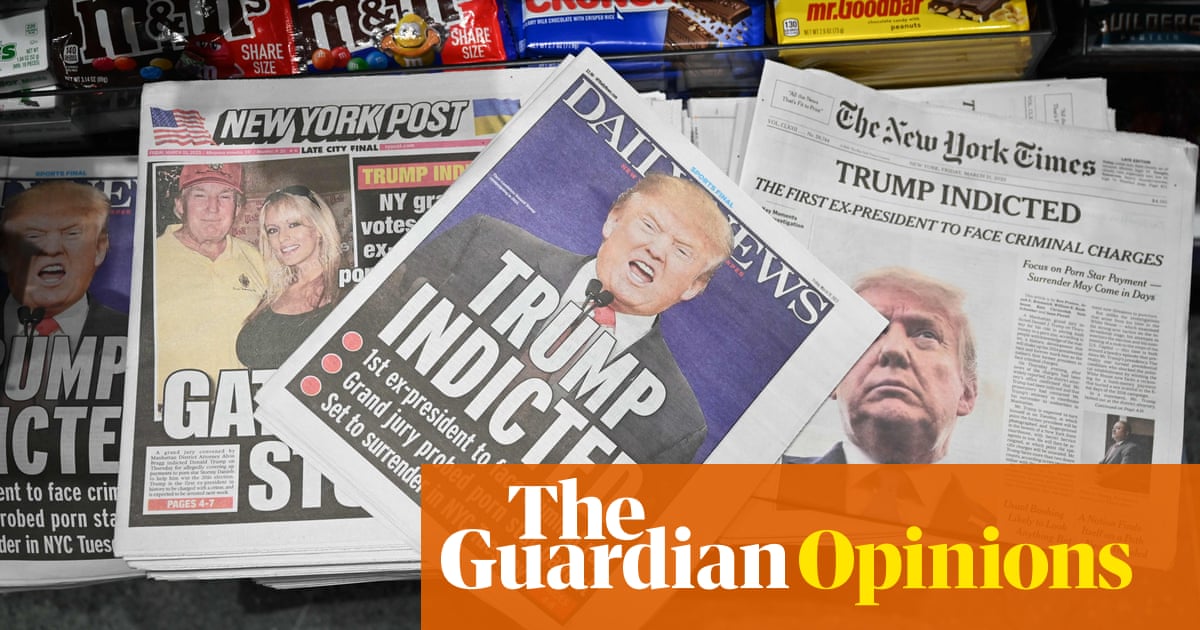
As a reality TV star, as a would-be business mogul, as a political candidate and as president, Donald Trump always counted on the news media to do his bidding.
When he said “jump”, he expected reporters to respond: “how high?”
And with some exceptions (the worthy investigative reporting that dug into who he really was), Trump got what he wanted.
The media jumped.
Over decades, he got the attention he craved: endless tabloid stories about his marriages and affairs, relentless coverage of his outrageous rallies and even cable-TV footage of an empty stage during the 2016 presidential campaign, waiting for the great manipulator to arrive.
He called himself “a ratings machine”, and for once, he wasn’t lying.
But now – and finally – that manipulation may have come back to bite him.
The Manhattan district attorney Alvin Bragg’s charges, detailed publicly on Tuesday, may never put Trump in jail, but, after a grand jury indictment, they already have resulted in making him a criminal defendant.
That’s a shameful first for a former US president, though Trump is wearing it like a badge of honor – and an opportunity to raise millions of dollars.
At the heart of the case is the tabloid newspaper practice known as “catch and kill”, an appalling way of getting rid of negative stories before they ever see the light of day.
From the DA’s “statement of facts”, which accompanied the bare-bones charges:
“From August 2015 to December 2017, the Defendant orchestrated a scheme with others to influence the 2016 presidential election by identifying and purchasing negative information about him to suppress its publication and benefit the Defendant’s electoral prospects.”
It goes on to charge that in order to execute this scheme, the participants violated election law and falsified business records in New York state, and, for tax purposes, misrepresented what the payments were for.
Given the indictment’s focus, I asked journalist Ronan Farrow, who did groundbreaking reporting on that practice both for the New Yorker and for his book Catch and Kill, for his reaction.
Bragg’s legal argument may be untested, Farrow told me, and the penalties may be limited even if he prevails, but it’s significant nonetheless.
“The fact that a DA is seeking to hold him accountable … signals a lack of tolerance in the criminal justice system for the tactics long used by tabloids like the Enquirer,” Farrow said via text message.
He called the events “a concerted scheme to conceal the facts around Donald Trump, with the specific aim of influencing the election”.
The DA’s charges and accompanying statement suggest, Farrow said, “an expansive approach and case to come”.
Even though the charges do not include conspiracy, the sense of an illegal plot hangs over the indictment, as David Corn of Mother Jones observed: “The big narrative is that Trump allegedly conspired to break election law with the catch and kill operation that embodied three episodes: the doorman, Playboy model Karen McDougal, and Stormy Daniels.”
The first episode had to do with a Trump Tower doorman’s story (apparently false) of an illegitimate child fathered by Trump; the McDougal story told of Trump’s longterm affair with the model; and Stormy Daniels, as we all know by now, is the adult film star who says she had sex with Trump after his promise to promote her career.
To kill the stories required the cooperation of AMI, the parent company of the National Enquirer, as well as that of Trump’s fixer Michael Cohen in 2015. David Pecker, the publisher, agreed to look out for negative stories and let Cohen know about them before publication. Cohen, as we know, did the dirty work and has paid a price.
That’s ugly. It’s not how the press is supposed to work.
But it’s very much in keeping with Trump’s longtime failure to see journalism as anything but a way for him to garner the adoring attention that he yearns for.
Nevertheless, Bragg’s charges were widely disparaged on Tuesday night. Observers – from Utah Republican senator Mitt Romney to Washington Post columnist Ruth Marcus to an array of Fox News pundits – found them variously underwhelming, or politically motivated, or legally dubious.
And maybe they will come to nothing or not too much. But I was heartened by Bragg’s public comment: “We cannot and will not normalize serious criminal conduct.”
It remains to be seen if a jury will agree.
But after so long of watching Trump use the media for his own twisted purposes, the DA’s words – and the focus of his charges – give me a measure of hope that there finally will be a price to pay.
Margaret Sullivan is a Guardian US columnist writing on media, politics and culture












